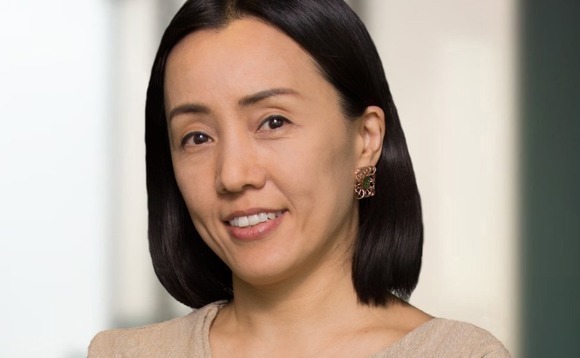
Q&A: CPPIB's Suyi Kim

Suyi Kim, global head of private equity at Canada Pension Plan Investment Board, on investing amid uncertainty, finding alignment with partners of all types, and the evolution of direct investment
Q: There is a lot of uncertainty around issues such as inflation, interest rates, and geopolitical risk. How is this impacting CPPIB's approach to private equity?
A: Whether it's private markets or public markets, investors are in the business of forecasting, and that has become much harder given all those uncertainties. As an investor, if it's hard to predict an outcome, you apply a higher bar to it – and also focus on understanding the potential range of outcomes. In addition to wider operating assumptions, the interest rate hike changes entry and exit multiple assumptions. The higher the growth rate of a business, the larger the multiple adjustment. You also need to look at longer-term trading multiples. With inflation, you can make all kinds of assumptions as to how it might impact economies and businesses. The challenge is that most of us, even those who have been investing for the last three decades, haven't seen this kind of inflationary environment in developed markets. It is quite an exercise to come up with a model and have confidence in it. That's why the bar gets higher and more diligence is needed when there is more uncertainty.
Q: What does this mean, in practical terms, for due diligence?
A: About half our global private equity portfolio is direct investment and half is funds. With fund investments, it is harder to time the market, but what I'm asking the team to do is to look at the longer-term track record of the manager, and its ability to handle crises. The most recent one is the global financial crisis. If a manager wasn't operational during this period, it is harder to predict their ability to navigate a downturn. We also assess how a manager has generated value. That comes from selecting an investment well, creating value during the ownership period, and exiting it well. We look at how revenue and EBITDA have grown, and the extent to which multiple expansion has contributed to returns. We are wary of managers that have been heavily reliant on multiple expansion.
Q: One industry response to the global financial crisis was the introduction of dedicated value creation teams. What might we see this time?
A: A key takeaway from the global financial crisis was that many investors globally didn't understand the macro factors that well. Private equity investing is bottom-up, so people would look at the companies, look at the industries, and not much outside of that. Coming out of the crisis, a lot of the large players set up their own macro teams or found a way to incorporate that perspective. We may see more of that going forward.
Q: Meanwhile, the pace of fundraising has slowed…
A: In the last couple of years, we have seen managers deploying capital very quickly and coming back within two years, which was unusual. We are going back to what we had before, which was four-year cycles. When there is uncertainty in the macro and business environment, buyers apply a higher bar, which creates a valuation gap between buyers and sellers, and in turn, leads to slower deployment and exits. We see that in our direct investment activity. Another reason for slower deployment is the leverage markets being closed. People were expecting the markets to reopen after Labour Day in the US, but that didn't happen because it coincided with higher-than-expected inflation numbers. As a result, the market for hung loans didn't get cleared. It probably won't happen until early next year. In the absence of debt, large deals are on hold.
Q: Have your views on specific geographies changed in the current environment?
A: Macro volatility is global; inflation is not global. When the Fed increases rates, it has a knock-on effect on currencies, and on imports and exports, and no one is immune to that. When we think about what we might have done differently at this point, no one region or country stands out. That is why having a diversified portfolio – by geography and by asset class – is so important. We have a large private equity portfolio, which is well-balanced and spread across North America, Europe, and Asia. The US is our largest market, and we are a bit overweight on the US going into this cycle. We are lighter in Europe. We have moved a portion of the European allocation to Asia over the last decade or so.
Q: How do you feel about China?
A: Investment has been slow for various reasons, not least because so much capital went into technology, and that sector has been in slow mode since Ant Group's failed IPO two years ago. But we will continue to invest in China and we continue to look for opportunities.
Q: How has the nature of CPPIB's engagement with GPs evolved?
A: We started a bit later in Asia and it's taking longer, given the overall maturity of the private equity market, but we have moved from passive co-investment to more active co-investment to co-sponsorship. A key part of our investment strategy is partnership. There are situations where we aren't working with private equity partners, but we still have partners – they could be other shareholders, management teams, or the founding families of companies. One of the lessons we've learned is it's great to have a partner, particularly in areas like value creation.
Q: Of the 50% of the private equity portfolio that is direct investment, how much of it comes through relationships with fund managers and how much through other partners?
A: We ask who is most aligned and who can create the most value. Oftentimes our private equity partners are most aligned. Most of our direct deals are investments alongside private equity partners, although in co-sponsorship situations where we play a more active role, they don't have to be managers that we are invested with on the funds side. Different partners bring different kinds of expertise to deals.
Q: How does the sourcing process work for deals where you don't have private equity partners?
A: We have an active list of companies we would like to own; they could be private equity owned or not. We have 200 investment professionals in private equity globally. Our direct investment teams are organised by industry verticals. Last summer, when deal flow was very slow, people studied their industry verticals and identified companies they would like to own.
Q: What would it take for CPPIB to do a solo direct deal in Asia?
A: Doing a solo deal is not in itself an objective. I tell our team all the time: the objective is to maximise risk-adjusted return. What is the smartest way to do that? Buy well, create a lot of value, and sell well. Capable partners can help us in each of these areas, especially in value creation. We can't claim to add value across all industries and all countries. Apart from a small operation in India, our Asia team is based in Hong Kong and private equity is a local business. Having partners who are on the ground, day in and day out, is very important.
Q: Why is the private equity team largely centralised in Asia rather than distributed across the region?
A: I don't think it helps to have people spread out too thinly. And even with local teams, we would still like to work with partners that bring deeper and broader resources. We like to have partners that can offer value creation capabilities we don't have internally.
Q: How do CPPIB's capabilities complement those of local partners?
A: We have experience and abilities in certain industries and areas. For example, we have a portfolio value creation team and one of the areas our team works with portfolio companies is in helping them with digitisation. We also have well-defined approaches to governance best practice, drawing on our expertise on the public markets side. We are an asset manager, with investments across different asset classes. A lot of our partners focus only on private equity, so there is expertise we offer that they cannot. For example, we understand public markets and we have a long history in sustainable investing, which means we are called on to help companies prepare for their IPOs.
Q: How often do you end up competing for assets with managers where there is a past relationship?
A: We partner with different private equity firms, based on the deal and the capabilities required. That is well understood. We pick our partners early on and work with them throughout the process for co-sponsorship deals. This incentivises partners to call us early if they want to work with us.
Q: To what extent is your long-dated investment horizon a competitive advantage?
A: It is a key differentiator. However, in the past few years, a lot of private equity firms have raised core funds comprising longer duration capital or they are raising continuation vehicles and can hold assets for longer. We still offer a lot more flexibility because we don't have a 15 or 20-year fund life and we don't need to raise continuation funds, but the gap has closed a bit.
Q: CPPIB recently committed to Capital Constellation, which invests in investment managers. Has CPPIB ever done this directly?
A: That is a small investment, and the main objective is to generate secondaries deal flow. We made direct investments in GPs a long time ago and learned some lessons from that. When a large institution like ourselves invests in a manager, we are not just taking a stake in the GP, we are promising to support that manager's funds in perpetuity.
Latest News
Asian GPs slow implementation of ESG policies - survey
Asia-based private equity firms are assigning more dedicated resources to environment, social, and governance (ESG) programmes, but policy changes have slowed in the past 12 months, in part due to concerns raised internally and by LPs, according to a...
Singapore fintech start-up LXA gets $10m seed round
New Enterprise Associates (NEA) has led a USD 10m seed round for Singapore’s LXA, a financial technology start-up launched by a former Asia senior executive at The Blackstone Group.
India's InCred announces $60m round, claims unicorn status
Indian non-bank lender InCred Financial Services said it has received INR 5bn (USD 60m) at a valuation of at least USD 1bn from unnamed investors including “a global private equity fund.”
Insight leads $50m round for Australia's Roller
Insight Partners has led a USD 50m round for Australia’s Roller, a venue management software provider specializing in family fun parks.








